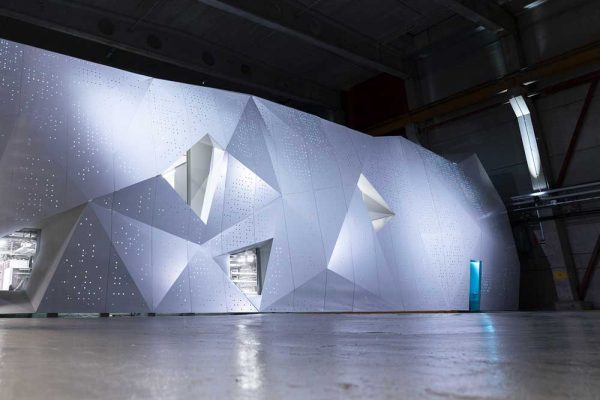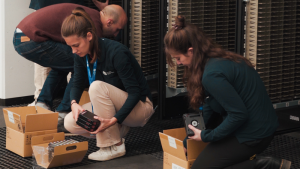Following the EuroHPC Summit conference in Gothenburg, Sweden, last month, HPCwire asked Steve Conway, senior analyst at Intersect360 Research, to interview Anders Jensen, executive director of the EuroHPC Joint Undertaking since September 2020. This appointment continues Anders’ lifelong interest in supercomputers, starting with his time at the Technical University of Denmark, where he earned an MS and an MBA. After spending the first part of his career working in engineering and pioneering IEEE802.11 wireless network technology with Symbol Technologies, Anders joined Cargolux Airlines International as IT director and was instrumental in the spinoff of the Cargolux IT department into CHAMP Cargosystems S.A. In 2011, Anders became director of NATO Headquarters’ Information and Communication Technology Service, assuming responsibility for all of NATO’s information and IT services as well as one of the largest classified networks in Europe.

HPCwire: An important goal of the EuroHPC Joint Undertaking (EuroHPC JU) is to establish European sovereignty in HPC and quantum computing. Why has establishing sovereignty become more important in recent years?
Anders Jensen: You are right! The primary raison d’être of the European High Performance Computing Joint Undertaking was precisely to increase the digital autonomy and sovereignty of the European Union. Building a European sovereign supercomputing ecosystem is critical on many levels.
Thanks to the fleet of the first world-class and top-ranked EuroHPC supercomputers, European scientists and industry are increasingly processing their data inside the EU. Such a trend is not only advancing science and boosting the innovation potential of companies and SMEs in Europe, but is also reinforcing the protection of the privacy, data protection, commercial trade secrets and ownership of data in Europe.
Fostering Europe’s technological leadership in HPC and quantum computing is also essential to bolster Europe’s competitiveness and resilience towards foreign technologies and imports.
All these elements were already true a few years ago when the EuroHPC initiative was launched but it is now even more obvious after recent international events such as the COVID-19 pandemic or the war in Ukraine, that establishing strong European digital and technological leadership and self-reliance in industry and science is of strategic importance for Europe.

We seem to be in an interim period where some European HPC suppliers are able to compete effectively with the best in the world while others haven’t reached that status yet. The interim strategy seems to be relying on non-European technology where needed and increasing the portion of European technology content in HPC systems procured under the JU. Is that correct?
As you know, in parallel with procuring and installing top-of-the-range supercomputers across Europe, the EuroHPC JU funds an ambitious research and innovation program to develop a full European supercomputing supply chain, from processors and software to applications and know-how.
Some initial progress is already tangible, such as the recent announcement made by SiPearl with the backing of our European Processor Initiative (EPI) project. The commercialization of Rhea, the world’s first energy–efficient, HPC-dedicated microprocessor designed in Europe to work with any third-party accelerator – GPU, artificial intelligence, quantum – is now planned for next year.
But as you underlined, this is an ongoing process, and efforts are still needed before reaching a full European supercomputing supply chain. Currently some non-European technologies are still needed if we want to place Europe in a leading position in the global supercomputing race and equip European users with a broad range of technologies and world-class machines that can boost European research and innovation.
Once Europe attains comprehensive technology independence, will HPC suppliers based outside of Europe have a role to play, for example if they perform a lot of research in Europe?
As I said, the JU is just taking the first steps to fill some gaps in the European HPC ecosystem and supply chain. The JU is guided by the European Commission and 33 European participating states who are indeed promoting the concept of technological autonomy. It is for the JU to implement their policies in the shape of R&I projects and procurements as agreed by our governing board in the context of the Multi-Annual Strategic Program and the implementation of its Work Program.
This strategy is win-win for all as it is leading to more R&I in HPC globally. This means that the global HPC sector as a whole will grow as investment in HPC technologies increases. HPC suppliers are all welcome to invest in Europe, and are indeed doing so now that they see that Europe is investing heavily in HPC technologies. Equally important, when the time comes, Europe will be more competitive globally in HPC and able to deliver greener and more innovative HPC solutions. So the question really is, will European vendors also be able to compete with non-EU vendors outside their European home markets?
To ensure that this happens, the JU will continue efforts to develop a full European supercomputing ecosystem. Over the last few years, EuroHPC JU has already seen a major shift in the global HPC market place. Last year, for the first time, Europe was ranked among the world’s top 5 in the Top500 list with LUMI and Leonardo. Europe is now recognized as a global leader in HPC by its partners.

Protective barriers exist today for European suppliers attempting to win HPC business in the U.S., Japan and China. Once Europe has an independent HPC supply chain equal to the best in the world, do you think Europe might need to establish its own protective barriers?
Our mandate is clear. We have been asked to spend European money to build a European HPC ecosystem which involves investment in HPC and quantum computing infrastructure, research and innovation, building up HPC competencies in applications, technologies and skills and of course usage. To do this, we will work with partners who are willing to contribute to our programs. Europe has invested in a very large HPC infrastructure and we need to ensure that Europeans are the first to benefit from this. If reciprocal arrangements can be found with third countries to explore strategic research and innovation partnerships, then this will be welcome. For example, we are working with U.S. companies including Intel, AMD, Nvidia and HPE, who are helping us build our HPC Infrastructure. We also have a call open at the moment to strengthen our cooperation with Japan.
Another aspect of sovereignty is that success metrics in exascale initiatives now rely less heavily on Linpack and more heavily on targeted performance gains on end-user applications that are considered important for a specific country or region. Is the JU taking this formal approach? Are there applications or market domains that the JU recognizes as especially important for Europe?
European researchers have a long and successful track record of developing HPC applications for research and engineering. It is part of the mission of the JU to build on this ecosystem and support further developments, for example by providing infrastructure and research grants that address challenges in the relevant domains and communities.
In this respect, the JU, as well as our communities and stakeholders, are well aware of the limitations of a single number resulting from an HPL benchmark run to describe the capabilities of an HPC system for the existing diversity of HPC applications.
Although there are currently no specific plans to abandon the concept of ranking the world’s fastest supercomputers, we note that application-focused benchmarks oriented towards real use cases already play a prominent role in system procurements, making sure that the EuroHPC supercomputers can serve a broad range of application domains. On this aspect, there is an increased emphasis placed on artificial intelligence and machine learning benchmarks as we see an increased demand for applications integrating such approaches into users’ workflows.
Unlike the U.S., Japan or China, Europe isn’t a single country with a single focus for sovereignty. Aside from advancing the HPC status of Europe as a whole, the JU serves 33 European states, each with its own language, culture and priorities for HPC use. Can you talk about the EuroCC initiative?
Indeed one of the challenges that Europe faces is that European countries are at very different levels of HPC expertise and experience, and the challenge is to even this out.
EuroCC is one the JU’s strategic initiatives to identify and address the skills gaps in the European HPC ecosystem and coordinate cooperation across Europe to ensure a consistent skills base. EuroCC has built a European network of more than 30 national HPC competence centers across Europe. The EuroCC’s competence centers act as hubs to promote and facilitate HPC and related technologies across a range of users from academia, industry – especially SMEs – and public administration. The aim is to increase access to HPC opportunities and offer tailored solutions for this fast-evolving field.
By first identifying their available competencies, individual countries can maximize synergies to build national competence portfolios. To ensure these benefit the whole network, European-level activities are coordinated at a European level. The NCC network also cooperates with other EuroHPC projects, such as Centers of Excellence for HPC Applications, and external bodies including the ETP4HPC and PRACE.
EuroCC is one the JU’s flagship projects and among the very first projects to get off the ground. With a second funding phase which started in January 2023, the NCCs will continue to boost synergies between the European and national levels to support a thriving European HPC ecosystem.
I understand that researchers in countries participating in EuroCC at the national level can also apply for access to European supercomputers. How does that work?
The access policy is currently the same for everyone: researchers from academia, research institutes, public authorities, and industry established or located in an EU Member State or in a country associated with Horizon 2020 can apply and access the EuroHPC supercomputers free of charge.
Currently three calls to access the EuroHPC supercomputers are open: the call for regular access, the call for extreme scale access and the call for benchmark and development access.
The calls are open for all fields of science and categories of applications (scientific, industry and public sector). The extreme scale access call is specifically distributing resources, from the EuroHPC pre-exascale systems – LUMI, Leonardo and MareNostrum5 – while the regular access and the benchmark and development ones also include the four petascale systems.
The calls are continuously open with several cut-off dates through the year. The EuroHPC JU Access Resource Committee, composed of leading international scientists and engineers, is ranking the proposals received and produces a recommendation to award EuroHPC JU resources based on scientific and technical excellence. More details on the access policy or the open access calls can be found on our website.
Do you see AI, HPDA and quantum computing mainly as accelerators of established HPC modeling and simulation applications or as important enablers of new applications?
First of all, most AI and HPDA technologies build on HPC by using HPC hardware, software and infrastructure. Quantum computers, on the other hand, provide a fundamentally new computing paradigm and a quantum computer integrated into a supercomputer may, indeed, be considered as an accelerator for specific algorithms similar to the current role of GPUs that perform certain operations more efficiently than general purpose processors
Currently we observe the adoption of, for example, concepts from AI in traditional simulation algorithms and applications, boosting performance and also potentially enabling novel use cases. The use of a quantum computing infrastructure in many cases requires a redesign or reinvention of existing algorithms and is expected to trigger the development of new HPC applications in the long term.
One of the JU’s goals is to provide users with a hybrid classical-quantum computer. Is it clear yet which quantum technology the computer will use? Which quantum technologies does the JU definitely want to explore?
Indeed, at the end of last year the EuroHPC JU has selected six sites across Europe to host and operate the first EuroHPC quantum computers: Czechia, Germany, Spain, France, Italy, and Poland. These quantum computers will be integrated into existing supercomputers.
Currently, we are still finalizing the hosting agreements with the six selected sites but what I can share at this stage is that the selection was made to ensure a diversity in quantum technologies and architectures and give European users access to many different quantum technologies. The JU will thus have the luxury of exploring different types of quantum technologies.
These six quantum computers come on top of two quantum simulators currently being developed under our project HPCQS and based on the technology of neutral atoms, supplied by the French company PASQAL. HPCQS aims to develop and coordinate a cloud-based European federated infrastructure, tightly integrating two quantum computers, each controlling 100-plus qubits in the Tier-0 HPC systems Joliot-Curie of GENCI and the JUWELS modular supercomputer at the Julich Supercomputing Centre (JSC).
I was very impressed by the sessions I attended at the recent EuroHPC Summit 2023 in Gothenburg, which had strong in-person and remote attendance. What do you see as highlights of that conference?
Thanks! The event was a great success with around 600 participants throughout the week. It was an important milestone for us, as this was the first EuroHPC Summit planned by our small JU team. It was an opportunity for the EuroHPC JU to reflect on our achievements in recent years, present our program and activities, and define our future priorities.
The Summit represents a coming together of the European HPC community. The program was the result of a collaboration with all the EuroHPC members, to highlight various aspects of European HPC and facilitate discussions with our partners and stakeholders. With almost 500 participants joining us physically in Gothenburg, I was reminded of the added value of meeting and exchanging in person and seeing our community around us.
A particular highlight of the Summit for me was the presence of our EUMaster4HPC students throughout the conference. Joining us as HPC Ambassadors, they were a big help to us from a logistical perspective, but it was also a huge boost to see these enthusiastic bright young faces attending their first HPC conference, learning about the community, making connections, and even securing internships and jobs for the future. We had a lot of positive feedback regarding the involvement of the students and we hope this will help to boost the visibility of this brand new program currently recruiting its second wave of students. By the way, the next deadline to apply online is the 31st of May.
Is there anything important about the JU’s plans that we haven’t discussed yet? When can we expect the next big announcements?
The JU staff is currently very busy with the procurement of JUPITER, the first European exascale system, to be installed in Julich, Germany. We are very excited about this new step as this next-generation supercomputer represents a significant technological milestone for Europe and will have a major impact on European scientific excellence.

As the installation of MareNostrum5 is already well under way, we also look forward to officially welcoming this new system to our fleet! We will also announce more systems as two calls for expression of interest recently closed, including a call for the selection of a Hosting Entity for another exascale system.
In addition, we will launch by the end of the year a call for Expression of Interest for the selection of a Hosting Entity to acquire and operate an industrial grade EuroHPC supercomputer, as the objective is to widen the access to our EuroHPC supercomputers. In parallel, the JU contributes to the European Union’s ambitions in European microprocessor technology on the basis of open standards, in particular the RISC-V instruction set architecture.
Another ambition of the JU for 2023 is to boost the development of the skills needed to widen the use of HPC in Europe. Several calls have been launched to boost European HPC training activities, such as an HPC Summer School, professional traineeships and a training platform. The calls closed earlier this month and the R&I team with external experts will now be busy evaluating the received proposals.
The JU has also launched a call to continue to support HPC applications with up to four additional Centers of Excellence (CoE) for HPC Applications addressing the exascale challenge. The call is currently still open. The objective is for the new CoEs to be launched early next year.
As you can see, many things are ongoing and there is never a dull moment at the JU!




























































